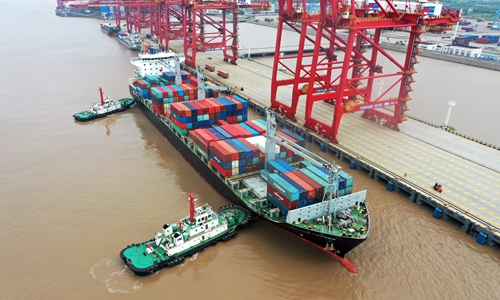China vows to perfect rules for ‘unreliable entity list’ in central government guideline
Source:Global Times Published: 2020/5/19 12:22:22

A cargo ship docks at the international container terminal in Zhoushan Port, East China's Zhejiang Province. Photo: cnsphoto
While further opening up its economy, China will perfect its rules for the country's"unreliable entity list," anti-monopoly investigation, national technological security management list system, and national security-related screening mechanisms for foreign investment, Chinese authorities said in a central government guideline on Monday.
The move came just days after a source close to the Chinese government told the Global Times that China is ready to take a series of countermeasures against a US plan to block semiconductor shipments to Chinese telecoms firm Huawei. That would include putting US companies on an "unreliable entity list," launching investigations into and imposing restrictions on US companies such as Apple, and halting purchases of Boeing airplanes.
The guideline also vowed to compile mid-term and long-term science and technology development plans, and to establish a national system to push forward key technology breakthroughs and use national scientific resources to focus on key areas and projects.
The new guideline aims to improve pre-entry national treatment plus negative list management, while removing all entry restrictions not included in the negative list, the Xinhua News Agency reported.
China would boost the opening-up of the country's manufacturing, services and agriculture sector to allow foreign-controlled or owned enterprises into more sectors and remove all entry restrictions not included in its negative list, the guideline said.
This is the latest among China's moves to expand opening-up to benefit every economy. The 2019 version of the country's negative list released last June cut a further eight items. Chinese Commerce Minister Zhong Shan said at a press briefing on Monday that the list will be further reduced.
Given huge opening-up challenges brought on by the global pandemic and the diminishing benefit of opening-up measures over the last 40 years, "China needs to roll out more concrete and attractive measures to optimize resource allocation," Bai Ming, deputy director of the Ministry of Commerce's International Market Research Institute, told the Global Times on Monday.
Bai said that sectors unrelated to national security such as healthcare and financial leasing may be gradually opened up.
These rules are necessary for China in its opening-up process, because "with more opening-up, we need more security measures," Bai said.
Zhong said that China will release incentives to attract foreign investment into the country's central and western regions as well as old industrial bases in the northeastern regions, which have abundant development potential.
The ministry will also focus on implementing the Foreign Investment Law, creating a fair and competitive market environment for foreign investors, he said.
Global Times